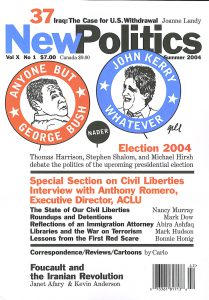. . .
New Politics, Vol. X, No. 1, Whole Number 37
New Politics, Vol. X, No. 1, Whole Number 37

Iraq: The Case for Immediate U.S. Withdrawal, Joanne Landy
In Defense of Tactical Voting (Sometimes), Stephen R. Shalom
The Dead-End of Lesser-Evilism, Thomas Harrison
Left Politics and Posturing in the Presidential Race, Michael Hirsch
Special Section on Civil Liberties
The State of Our . . .
Multiculturalism and Science
Multiculturalism has become mainstream. Across North America and Europe, school curricula are checked for accurate representation of non-Western and non-white cultures. Research examining the culturally conditioned character of all aspects of knowledge has not only gained a hearing in academic journals, but has sometimes been integrated into popular textbooks from kindergarten on up.
Revisiting Foucault and the Iranian Revolution
February 2004 marked the twenty-fifth anniversary of the Iranian Revolution. From September 1978 to February 1979, in the course of a massive urban revolution with millions of participants, the Iranian people toppled the regime of Muhammad Reza Shah Pahlavi (1941-1979), which had pursued a highly authoritarian program of economic and cultural modernization. By late 1978, the Islamist faction led by Ayatollah Ruhollah Khomeini had come to dominate the antiregime uprising, in which secular nationalists, democrats, and leftists also participated.
The New Unity Partnership: Sweeney Critics Would Bureaucratize to Organize
What John Sweeney did unto Lane Kirkland in 1995 may now be done unto him. On September 18, this year, Sweeney announced he would run for reelection as AFL-CIO president, along with Rich Trumka, secretary-treasurer, and Linda Chavez-Thompson, executive vice-president. But his term of office doesn't expire until mid 2005, almost two years to go.
U.S. Libraries and the "War on Terrorism"
In the days and weeks following the September 11, 2001 Al-Qaeda terrorist attacks in the northeastern United States, there was a sudden proliferation of U.S. flags and other patriotic imagery in public libraries across the nation. U.S. public libraries have traditionally displayed U.S. flags inside or atop their buildings, even though they are financed by local and state tax money and receive little if any federal funding. But the new patriotic décor went well beyond any simple statement of solidarity with the nation in a time of crisis.
Roundups, Detention, and Other Phantoms of Lost Liberty
In an Alabama district court a few years ago, the Department of Justice made an argument familiar to those who have read immigration cases: it asked the court to keep its hands off. The department argued for what I call "double deference." First, the court should defer to the executive and legislative branches as a matter of course in immigration matters; and second, the court should defer to the jail where the plaintiff was being incarcerated since prison administrators need wide latitude in operating their lock-ups.
Sustaining Democratic Life: An Interview with the ACLU's Anthony Romero
This is a lightly edited transcript of an interview conducted by Mark Dow and Kent Worcester with Anthony Romero in April 2004 in his lower Manhattan office.
New Politics: Yesterday during the September 11 Commission hearings, when he was defending some of the Patriot Act measures that have been criticized, Ashcroft said that a lot of what the Patriot Act did was simply to extend measures that were already in existence.
Anthony Romero: Patently false.
Left Politics and Posturing in the Presidential Race
he November election poses a dilemma for leftists. Both major parties embrace the agenda of corporate America. Neither challenges the assumptions of American empire, and politics as usual will be followed by a Washington regime that will be at best agnostic toward the needs of progressive social movements if not hostile to it. Against this, Ralph Nader is again launching a crusade against both parties.
The Dead-End of Lesser Evilism
The November election poses a dilemma for leftists. Both major parties embrace the agenda of corporate America. Neither challenges the assumptions of American empire, and politics as usual will be followed by a Washington regime that will be at best agnostic toward the needs of progressive social movements if not hostile to it. Against this, Ralph Nader is again launching a crusade against both parties.
In Defense of Tactical Voting (Sometimes)
The November election poses a dilemma for leftists. Both major parties embrace the agenda of corporate America. Neither challenges the assumptions of American empire, and politics as usual will be followed by a Washington regime that will be at best . . .
Iraq: The Case for Immediate U.S. Withdrawal
IT'S HARD TO SEE HOW the Bush administration is going to win the war in Iraq. Despite all the official bravado, a cloud of doom is descending on the White House, and with good reason: international outrage is mounting at U.S. behavior at Abu Ghraib prison and throughout Iraq, more and more Americans are concluding that the war is going badly, and Iraq is proving uncontrollable with reports, in May, that only 35 percent of Iraqis want U.S.
